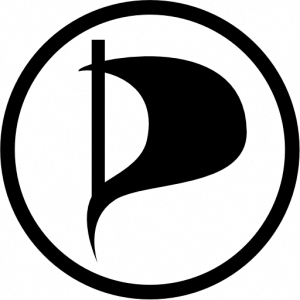
Continuing in the spirit of further broadening the scope of our inquiries here, I wanted to bring up the topic of the Pirate Party, which is probably the most institutional (especially in Europe) force of opposition to notions of intellectual property. First, a very brief history:
The Pirate Party originated in Sweden in 2006, where it (the Piratpartiet) is currently the third largest political party in terms of membership, with just under 50,000 members (most of whom are in the youngest demographic ranges). The Ung Pirat is the single largest political youth organization the country. In 2009, the Piratpartiet received enough votes to seat Christian Engstrom as one of Sweden’s 18 European Parliament members and are likely to seat a candidate in Sweden’s own parliament after the next election cycle (they narrowly missed in 2006).
Pirate Parties have now spread across Europe and are active, if not registered, in several other countries, including the United States.
According to the their website, the Piratpartiet’s chief platform is as follows:
The Pirate Party wants to fundamentally reform copyright law, get rid of the patent system, and ensure that citizens’ rights to privacy are respected. With this agenda, and only this, we are making a bid for representation in the European and Swedish parliaments.
Here is a video of Rickard Falkvinge, founder of the Piratpartiet, explaining the Party’s agenda vis a vis civil liberties and the histories of copyright and media technology:
For those of us more familiar with the American political context, here are some excerpts from the unregistered American Pirate Pary’s platform:
The idea that sharing anything online is piracy is absurd on its face. Actual piracy requires forceful and aggressive acts, committed against those who would keep a cargo safe from harm. The cargo in this case is the freedom to act. We would take it from those who jealously guard it for themselves and divide it amongst everyone in the country.
…
We are not willing to accept that file sharing should be banned (and will take steps, once we have party members in office, to ensure that any laws in this regard are adamantly opposed, since technology isn’t the problem, but rather education about what its proper use is). On the other hand, we do agree that there is a significant amount of wrong being done to our rights in the name of protecting those whose sole aim for over 50 years has been the control and manipulation of human minds.
…
All DRM and similar schemes do are to encourage people to find ways to prevent loss by circumvention. DRM is the key issue in the DMCA, and the chief reason that our population is now breaking the law en masse. DRM itself also inhibits the rights of artists to have their works experienced in as close to a live act as possible.
It’s worth noting both that this platform extends beyond explicit issues of file sharing and copyright to include government transparency, privacy rights, and a range of First Amendment issues. It’s also worth noting that the language on the website doesn’t attempt position the Party within mainstream American political dialogue (with a caveat that the Glenn Becks and Rush Limbaugh’s of the world make the boundaries of “mainstream dialogue” increasingly difficult to pinpoint). Even so, they are creating a space for public discourse around intellectual propery within the realm of electoral politics (as opposed, for instance, to academics).
Interestingly, Lawrence Lessig has expressed some criticism of the US Pirate Party, in that he believes that forwarding a discourse of “piracy” fuels the notion that p2p is synonymous with theft, which he believes will undermine the Free Culture movement.
While this may seem to be a semantic point, my expectation is that Lessig’s belief in a fundamental need for a copyright system in order to encourage the continued production of creative work creates some friction with the Pirate Party’s platform.
Overall, however, I think that it’s important for us to recogize the development of the Pirate Party (rather, Parties) as an important counter-narrative to the history of increasing enclosure that we so often cover. That is, we should be sure analyze movements of both restriction and resistance.
Discussion